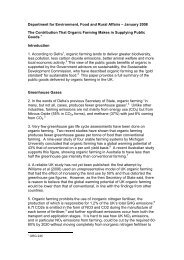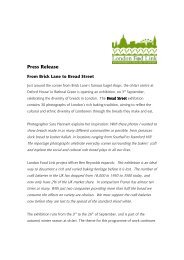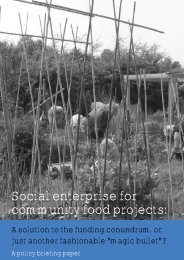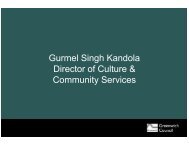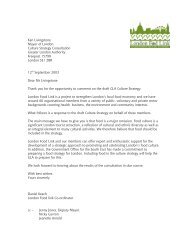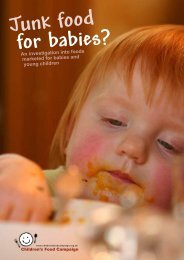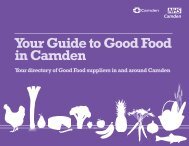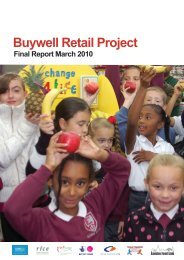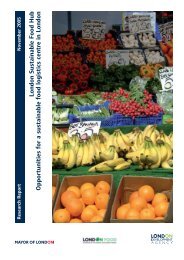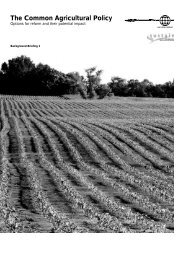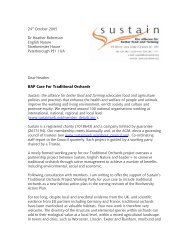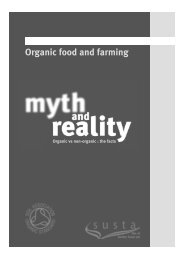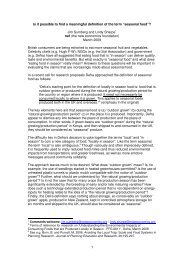Good Food for Camden - Sustain
Good Food for Camden - Sustain
Good Food for Camden - Sustain
Create successful ePaper yourself
Turn your PDF publications into a flip-book with our unique Google optimized e-Paper software.
Appendix 6NHS <strong>Camden</strong>National Indicators (NI)North London Waste Authority(NLWA)NHS <strong>Camden</strong> is the operating name <strong>for</strong> <strong>Camden</strong> Primary Care Trust (PCT), the local NHS organisationresponsible <strong>for</strong> providing healthcare <strong>for</strong> people who live in <strong>Camden</strong>. NHS <strong>Camden</strong> commission or pay <strong>for</strong>services from a wide range of health providers, including GPs, dentists, opticians and community pharmacies,acute trusts and mental health trusts. They are also responsible <strong>for</strong> supporting the local population of <strong>Camden</strong> tomaximise health by promoting healthy lifestyles, <strong>for</strong> example through services like the stop smoking service andsensible drinking service.National Indicators (NI) are designed to measure progress on national priority services where they are run bylocal councils acting alone or in partnership. Councils have to select up to 35 designated targets from the list ofindicators <strong>for</strong> their local area agreements (see description above). The new National Indicator Set (NIS) came intooperation on 1 April 2008.The North London Waste Authority (NLWA) was established in 1986 and is the statutory waste disposal authority<strong>for</strong> seven local authorities, these are: Barnet, <strong>Camden</strong>, Enfield, Hackney, Haringey, Islington and Waltham Forest.The NLWA’s primary function is to arrange <strong>for</strong> the transport and disposal of waste collected by these sevenboroughs and to promote waste minimisation and recycling. See www.nlondon-waste.gov.uk <strong>for</strong> more in<strong>for</strong>mation.ObesityPersonal, Social, HealthEducation (PSHE)Public procurementSeasonal foodWaste & Resources ActionProgramme (WRAP)A person is considered obese if they have a Body Mass Index (BMI) of 30 or greater. (BMI is a measurement ofweight in kilograms divided by height in metres squared).Personal, Social, Health Education (PSHE) includes everything schools do to promote pupils’ good health andwell-being and supports children and young people to make in<strong>for</strong>med decisions about their lives. It is a plannedcurriculum area that contributes to pupils’ life changes, developing knowledge, understanding, skills and attitudes.The purchasing of goods and services by public sector institutions, namely hospitals, schools, care homes,prisons and other organisations funded by the ‘public purse’.Seasonal food is food grown or reared during the time of year it naturally occurs in the UK without relying on, <strong>for</strong>example, oil-fueled electricity to heat greenhouses, coal-fueled electricity <strong>for</strong> cold storage, energy generated fromnon-renewable sources such as gas or coal, or agricultural chemicals (based on fossil fuels) to artificially extendthe growing season.WRAP (Waste & Resources Action Programme) helps individuals, businesses and local authorities to reducewaste and recycle more, making better use of resources and helping to tackle climate change. See www.wrap.org.uk <strong>for</strong> more in<strong>for</strong>mation.<strong>Good</strong> <strong>Food</strong> <strong>for</strong> <strong>Camden</strong>: The healthy and sustainable food strategy52



